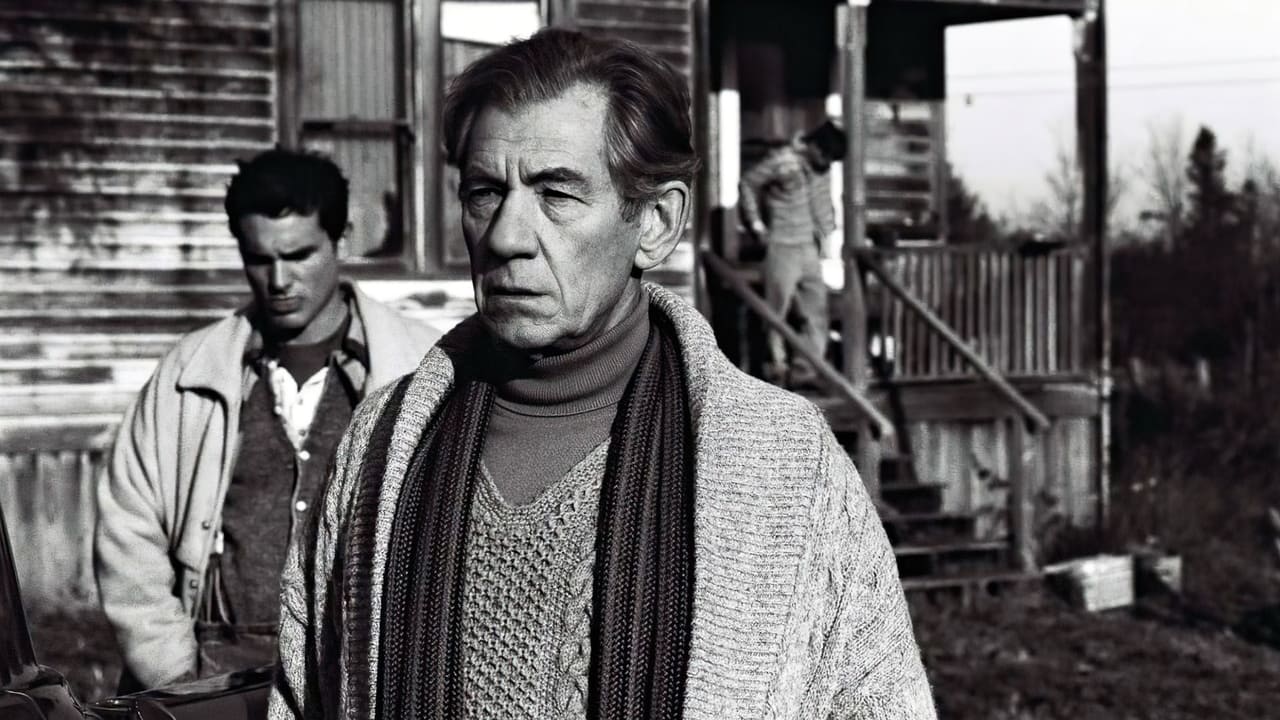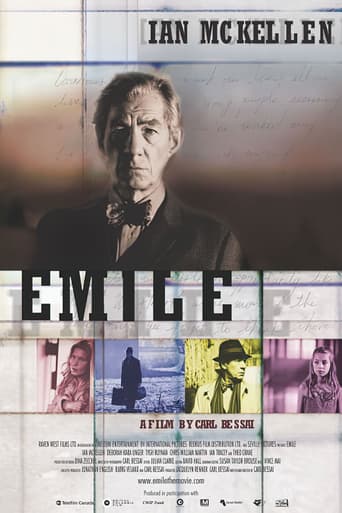

Truly Dreadful Film
... View MorePurely Joyful Movie!
... View MoreTells a fascinating and unsettling true story, and does so well, without pretending to have all the answers.
... View MoreIt really made me laugh, but for some moments I was tearing up because I could relate so much.
... View MoreEmile is a Canadian independent film which, unlike some of its more recent American counterparts, isn't afraid of exploring bare-boned, delicate territory without either constructing portraits of its characters as total freaks or necessarily feeling the need to deceptively 'mainstreamise' its overall content with generally offbeat material and off-colour, idiosyncratic dialogues. Sure, they touch on some rather delicate topics, ranging from unanticipated pregnancy to various mental illnesses to those fond of sadomasochism, but rarely do we feel as if the characters in projects such as Juno or Secretary actually exist – they are fanciful excursions into realms populated by those we are wary of rather than sympathetic of, and more often than not carry with them excess levels of vanity. In Carl Bessai's 2004 film Emile, we feel as if we could live down the street from them; his film is one of which explores a man and the results that came about after his decision, during young-adulthood, to put himself before others, regardless of the riches that decision had him end up with, before returning to the locale of his young-adulthood years and piecing together the second generation of his family's situation that has been brought about because of this.The film covers that of the titular Emile, played extraordinarily by British actor Ian McKellen; a performance full of nuance and delicacy, a performance seemingly lost amidst the bigger budgeted, larger distributed Lord of the Rings and X-Men sequels of the same year in which he additionally starred, but a performance fraught with authenticity and affluence as he comes to integrate with varying supporting acts of differing ages; genders and apparent class backgrounds. Indeed, the film will open on the England based, but Canadian born, author of later on in years Emile; the aftermath of a speech at a large function seeing him very much the centre of attention and seemingly at the peak of his proverbial academia-imbued game. The camera decides to track in on Emile, in a wavy and distorted manner, as if cause for concern was required amidst the rapturous applause and success story that is this man: the film's eventual framework alluded to as here, as the bearing in on the surface qualities of a man and into something more troubled, plays out.Through one means or another, Emile winds up back in Canada again; the receiving of an honorary degree from an institute in his home province of Saskatchewan the catalyst from the outside forcing him back to his roots, allowing apparent issue and such to be buried. It's here the character of Nadia, Emile's niece, enters proceedings; someone brought to life by that of Canadian actress Deborah Kara Unger, whose general facial expression in whatever film she's in always seems to epitomise that of anguish or one that is wrought with the weight of the world. She has certain things on her shoulders here, the woman clearly outspoken and rather vocal – refusing first impressions on that of anyone; her daughter Maria undergoing, what we presume to be from an early exchange with her mother, a rather strict upbringing as she comes to terms with her own life situation of being forced into moving states to get away from an ex-husband.It is a situation, the escaping of one's family-imbued problems and leaving on negative terms as trouble brews within a family unit, that echoes that of Emile's; his decision to initially leave Canada being what it is, when the establishment of his back-story to do with his two brothers is what it is. Out of these beginnings, it is made obvious that Emile and Nadia's friendly connection might be read into as being born more out of other items than merely that of quaint family ties. Being relocated in Canada for this brief period allows Emile to hark back to the past; specifically, the ability to look back at his time as a young man with his thoughtful and more humane brother Freddy (Runyan) and his bigger, more primitive sibling Carl (Martin), whose aggression and such on the farm that they're based spawns degrees of conflict. Emile's consequent leaving of this aforementioned unit to study in England, usually the land of academia in these instances, leads him to be the man he is now but seemingly at the cost of a close tie with Freddy, whose own promise leads to its own respective conclusion. Bessai weaves the back-story to that of what happened to Emile in with the present strand wonderfully well; the execution, as specific analeptic manipulations play out furthermore within the flashbacks, are handled with such competence and guile, that it is difficult not to become so involved. Indeed, the results are naturalised; involving, brooding and really rather good.
... View MoreMcKellen plays a senior UK academic returning to Canada to receive an honorary degree. He stays with his niece (Unger) who is newly separated (that's her hubby off the budget) and her grumpy adolescent daughter. Relations are frosty at first until the issue gets aired, which sets our hero off on a journey down memory lane to his troubled family farm on the prairies. Everything revolves around McKellen and his character, whom we have to believe and care about. Sadly, we learn almost nothing about him apart from an initial glimpse of his college rooms and a dumpy woman "assistant" (with the muted suggestion that he is gay). We do not even learn anything about his scientific studies, the focus of his life's work, so his character would not pass the elementary requirements of a screen writing software package. How scripts with structural problems like this get green-lighted by national film-funding bodies is beyond me. There is a further problem with Unger's character, when she asks the professor: "Do you remember my mother?" and he says "not really", thus removing any possibility of dealing with the orphaned Unger's most important relationship. A further problem arises with the flashback passages in which we glimpse his brothers, but not well enough to understand their motivations or his relationship with them. Finally, the script fails to provide an adequate breakthrough to resolve his situation, and the pay-off is therefore unsatisfying. However, because the film is intelligently filmed and directed, these faults are not hidden, and the film works in spite of them, particularly for McKellen fans who love his puckish face and plummy accent.
... View MoreYou are well into the second quarter of this film before you can figure out just who is who. The frequent flashbacks, done in a style that would work better on a stage than on the screen, are confusing until you figure out what is happening. Nevertheless it is a warm picture with a good cast and a straightforward plot that generates some very human moments. At least it's a film --- and a reasonably decent one --- that shows Canada as Canada and not disguised as a stand-in for some place in the US. It's obviously done on a low budget with an unknown cast but that does not have a heavy impact on quality. There is some young talent here on both sides of the camera. Not a great film, but not a bad one either.
... View MoreIan McKellan does a compelling rendition of an aging man come back to revisit and face his past indiscretions. This is augmented by some wonderful performances by some remarkable Canadian actors. Particularly Tygh Runyan and the young Theo Crane. They give refreshingly honest and real performances.
... View More